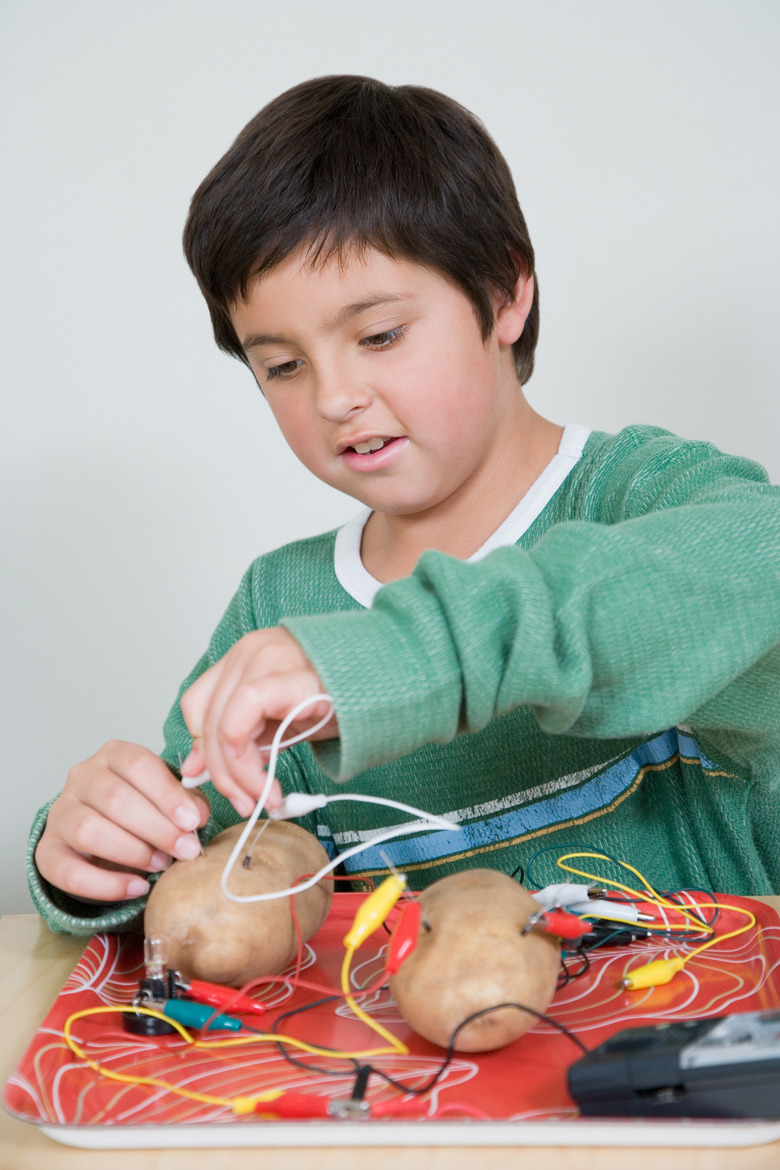5th Grade Science Electricity Experiments For Students
Choosing a science experiment for a fifth-grade science project leaves room for many options. Science can be a fascinating and compelling subject for many students, with projects chosen reflecting their interest. When making this decision, opt for an experiment focused around electricity which allows students a chance for hands-on education in a fun and safe environment.
Super Sparker
Super Sparker
Make lightening by using free electrons in hair. Gather a Styrofoam tray, a pair of scissors, masking tape and an aluminum pie tin. Cut a piece of the Styrofoam tray in the shape of an "L," taping it inside a pie tin to create a handle. Rub hair with the leftover Styrofoam tray, dropping it upside down on the floor when done. Pick up the pie tin using the homemade handle, hold the tin about one foot over the tray and drop it. Touch your fingertip to the pie tin, observing the spark it makes. Experiment with picking the tin up by its handle and touching the tin or dropping the pie tin over and over again onto the tray, ideally in the dark, making notes of the sparks seen. Record results for presentation.
Charging a Light Bulb
Charging a Light Bulb
This experiment requires a metal comb or a scarf made of wool, a dark room and a light bulb. Take a scarf or wooden comb and run it through your hair in a fast motion several times for a minute. Touch the comb or woolen scarf to the metal end of the light bulb and observe how the bulb lights up from the electrons that are produced. Experiment with how bright the bulb gets depending on how many times or how long you rub your hair with the comb or scarf. Record findings and gather information for a formal class presentation, complete with demonstration.
Battery Life
Battery Life
Test the battery life of four different battery brands showing which one uses the electricity produced through battery power the longest. With the help of an adult, purchase four different name brands of batteries and four new flashlights from the hardware store. Before going to bed, put new batteries inside all of the new flashlights and turn them on. Record the time they are turned on and label flashlights with which battery is inside them. Upon waking, note any flashlights that have burned out, and watch the others for the times they go out. Record results for class presentation.
Open and Short Circuits
Open and Short Circuits
Show the difference between open and short circuits with this experiment. Gather wire clippers, a 9-volt battery (nothing larger), about 15 inches of bare wire and small light bulb. Cut the wire into three pieces of wire measuring 5 inches each. Connect two pieces of wire from the battery poles directly onto the light bulb, noting that it turns on. Using the last piece of wire, place it across the other two wires. This creates a short circuit and the light bulb light will turn off since the path the electricity was traveling has been interrupted. Take the wire off again, then cut one of the wires that leads from the battery to the light bulb. Note that the light bulb turns off, and this simple act has created an open circuit.
Cite This Article
MLA
Kemp, Anne. "5th Grade Science Electricity Experiments For Students" sciencing.com, https://www.sciencing.com/5th-science-electricity-experiments-students-8704776/. 24 April 2017.
APA
Kemp, Anne. (2017, April 24). 5th Grade Science Electricity Experiments For Students. sciencing.com. Retrieved from https://www.sciencing.com/5th-science-electricity-experiments-students-8704776/
Chicago
Kemp, Anne. 5th Grade Science Electricity Experiments For Students last modified August 30, 2022. https://www.sciencing.com/5th-science-electricity-experiments-students-8704776/
